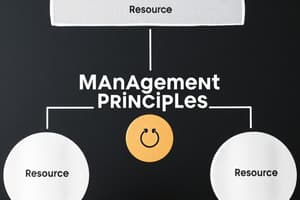Podcast
Questions and Answers
What is the primary focus of the planning function in management?
What is the primary focus of the planning function in management?
- Monitoring performance against plans
- Recruiting and developing employees
- Arranging resources and tasks
- Setting objectives and determining actions (correct)
Which of the following roles is classified under decisional roles?
Which of the following roles is classified under decisional roles?
- Disturbance Handler (correct)
- Monitor
- Spokesperson
- Disseminator
Which managerial skill is defined by proficiency in specific tasks or areas of expertise?
Which managerial skill is defined by proficiency in specific tasks or areas of expertise?
- Interpersonal Skills
- Conceptual Skills
- Technical Skills (correct)
- Human Skills
What does the staffing function primarily focus on?
What does the staffing function primarily focus on?
Which of the following is NOT a function of management?
Which of the following is NOT a function of management?
What is the purpose of the controlling function in management?
What is the purpose of the controlling function in management?
Which role focuses on sharing information with the team?
Which role focuses on sharing information with the team?
Which managerial skill becomes more prevalent at higher management levels?
Which managerial skill becomes more prevalent at higher management levels?
What is a primary characteristic of management as a universal function?
What is a primary characteristic of management as a universal function?
Which of the following best describes the goal-oriented nature of management?
Which of the following best describes the goal-oriented nature of management?
In what capacity do first-line managers primarily operate within an organization?
In what capacity do first-line managers primarily operate within an organization?
Which of the following objectives of management focuses on customer needs?
Which of the following objectives of management focuses on customer needs?
Which is NOT considered one of Mintzberg’s interpersonal roles of a manager?
Which is NOT considered one of Mintzberg’s interpersonal roles of a manager?
How does management enhance organizational efficiency?
How does management enhance organizational efficiency?
What is a defining feature of the social science aspect of management?
What is a defining feature of the social science aspect of management?
Which level of management is primarily responsible for implementing policies established by higher management?
Which level of management is primarily responsible for implementing policies established by higher management?
Flashcards are hidden until you start studying
Study Notes
Nature of Management
- Management principles apply across various organizations and sectors, regardless of size or industry.
- Management focuses on achieving specific goals and objectives.
- Management involves coordinating the efforts of individuals working together in a group.
- Management incorporates principles from various social sciences, such as psychology, sociology, and economics, to understand and influence human behavior in organizations.
- Management is a continuous process that includes planning, organizing, leading, and controlling resources to achieve desired outcomes efficiently.
Objectives of Management
- The primary objective is to achieve organizational goals effectively and efficiently.
- Management aims to optimize resource use to enhance productivity and minimize waste.
- Management seeks to ensure that the organization generates sufficient profits and returns on investments made by stakeholders.
- Management focuses on meeting customer needs and expectations, which is crucial for long-term success.
- Management fosters positive relationships with suppliers to ensure a smooth supply chain and collaboration for mutual benefit.
Levels of Management
- Top-Level Managers
- Roles: CEOs, Presidents, and Executives.
- Responsibilities: Setting strategic goals, defining policies, and making high-level decisions.
- Middle-Level Managers
- Roles: Department Heads, Regional Managers.
- Responsibilities: Implementing policies, coordinating between top-level management and first-line managers, and overseeing departments.
- First-Line Managers
- Roles: Supervisors, Team Leaders.
- Responsibilities: Managing day-to-day operations, supervising staff, and ensuring tasks are completed efficiently.
Roles of Managers (Mintzberg's Theory)
- Interpersonal Roles
- Leader: Motivating and managing staff.
- Liaison: Connecting with external stakeholders.
- Figurehead: Representing the organization.
- Informational Roles
- Monitor: Gathering internal and external information.
- Disseminator: Sharing information with the team.
- Spokesperson: Communicating on behalf of the organization.
- Decisional Roles
- Entrepreneur: Innovating and initiating changes.
- Disturbance Handler: Managing conflicts and crises.
- Resource Allocator: Distributing resources effectively.
- Negotiator: Engaging in negotiations internally and externally.
Functions of Management
- Planning
- Involves setting objectives and determining the best course of action to achieve them.
- Requires forecasting future conditions, evaluating resources, and establishing strategies.
- Ensures the organization is prepared for challenges and opportunities.
- Organizing
- Refers to the arrangement of resources and tasks to implement the plan.
- Includes defining roles, responsibilities, and relationships within the organization.
- Ensures the right resources are in place to achieve objectives and a clear structure for decision-making and workflow.
- Staffing
- Involves recruiting, selecting, training, and developing employees.
- Crucial for ensuring the organization has the right people with the necessary skills to perform tasks.
- Includes evaluating performance and fostering a supportive work environment.
- Directing
- Focuses on leading and guiding employees to achieve organizational goals.
- Involves motivating, communicating, and providing direction to teams.
- Requires strong interpersonal skills to inspire and influence others, ensuring alignment and working towards common objectives.
- Controlling
- The process of monitoring progress and performance against established plans
- Involves setting performance standards, measuring actual performance and taking corrective actions when necessary.
- Helps ensure the organization stays on track to meet goals and can adapt to change or challenges.
Managerial Skills
- Technical Skills
- Proficiency in specific tasks or areas of expertise.
- Human Skills
- The ability to work effectively with people, understanding their needs and motivations.
- Conceptual Skills
- The ability to think critically, solve problems, and make decisions based on a broad understanding of the organization and its surroundings.
Studying That Suits You
Use AI to generate personalized quizzes and flashcards to suit your learning preferences.




